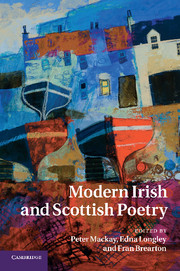Book contents
- Frontmatter
- Contents
- List of contributors
- Acknowledgements
- Introduction
- 1 Swordsmen: W. B. Yeats and Hugh MacDiarmid
- 2 Tradition and the individual editor: Professor Grierson, modernism and national poetics
- 3 Louis MacNeice among the islands
- 4 Townland, desert, cave: Irish and Scottish Second World War poetry
- 5 Affinities in time and space: reading the Gaelic poetry of Ireland and Scotland
- 6 Contemporary affinities
- 7 The Classics in modern Scottish and Irish poetry
- 8 Translating Beowulf: Edwin Morgan and Seamus Heaney
- 9 Reading in the gutters
- 10 ‘What matters is the yeast’: ‘foreignising’ Gaelic poetry
- 11 Outside English: Irish and Scottish poets in the East
- 12 Names for nameless things: the poetics of place names
- 13 Desire lines: mapping the city in contemporary Belfast and Glasgow poetry
- 14 ‘The ugly burds without wings’?: reactions to tradition since the 1960s
- 15 ‘And cannot say / and cannot say’: Richard Price, Randolph Healy and the dialogue of the deaf
- 16 On ‘The Friendship of Young Poets’: Douglas Dunn, Michael Longley and Derek Mahon
- 17 ‘No misprints in this work’: the poetic ‘translations’ of Medbh McGuckian and Frank Kuppner
- 18 Phoenix or dead crow? Irish and Scottish poetry magazines, 1945–2000
- 19 Outwith the Pale: Irish–Scottish studies as an act of translation
- Guide to further reading
- Index
- References
6 - Contemporary affinities
Published online by Cambridge University Press: 18 April 2011
- Frontmatter
- Contents
- List of contributors
- Acknowledgements
- Introduction
- 1 Swordsmen: W. B. Yeats and Hugh MacDiarmid
- 2 Tradition and the individual editor: Professor Grierson, modernism and national poetics
- 3 Louis MacNeice among the islands
- 4 Townland, desert, cave: Irish and Scottish Second World War poetry
- 5 Affinities in time and space: reading the Gaelic poetry of Ireland and Scotland
- 6 Contemporary affinities
- 7 The Classics in modern Scottish and Irish poetry
- 8 Translating Beowulf: Edwin Morgan and Seamus Heaney
- 9 Reading in the gutters
- 10 ‘What matters is the yeast’: ‘foreignising’ Gaelic poetry
- 11 Outside English: Irish and Scottish poets in the East
- 12 Names for nameless things: the poetics of place names
- 13 Desire lines: mapping the city in contemporary Belfast and Glasgow poetry
- 14 ‘The ugly burds without wings’?: reactions to tradition since the 1960s
- 15 ‘And cannot say / and cannot say’: Richard Price, Randolph Healy and the dialogue of the deaf
- 16 On ‘The Friendship of Young Poets’: Douglas Dunn, Michael Longley and Derek Mahon
- 17 ‘No misprints in this work’: the poetic ‘translations’ of Medbh McGuckian and Frank Kuppner
- 18 Phoenix or dead crow? Irish and Scottish poetry magazines, 1945–2000
- 19 Outwith the Pale: Irish–Scottish studies as an act of translation
- Guide to further reading
- Index
- References
Summary
In the Summer of 1963 or '64 I hitchhiked through much of Ireland with my fiancée, developing a fondness for the place and discovering the metabolic mysteries of Guinness. We already knew Dublin. The night ferry from Glasgow's Broomielaw had for years been a well-known rendezvous of the west of Scotland's lovers in search of a night's amorous privacy. It is not the manner in which Irish–Scots connections are discussed these days, but it will do.
In a Dublin bookshop I bought a copy of a magazine, Arena, edited by James Liddy. It contained a poem by Derek Mahon, an uncharacteristic one to be sure, but I found it interesting. At the age of 21 or 22 I was in the process of identifying writers, poets especially, with whose work I could find an affinity. As a young librarian I had access to books, but the Andersonian Library of the Royal College of Science and Technology, subsequently University of Strathclyde, was not exactly stocked with volumes of modern or contemporary verse, never mind little magazines. While I knew a few who wrote poems, or tried, and knew of others, and was becoming familiar with the work of my immediate elders, mainly Scots such as MacDiarmid, Edwin Muir, W. S. Graham and Norman MacCaig, in the early 1960s Iain Crichton Smith was just beginning to establish a reputation, as was George Mackay Brown. Edwin Morgan was little more than a name to me.
- Type
- Chapter
- Information
- Modern Irish and Scottish Poetry , pp. 119 - 130Publisher: Cambridge University PressPrint publication year: 2011

